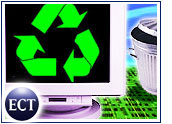
Electronics industry companies are moving forward aggressively with plans to promote the recycling of used mobile phones — as well as PDAs and other devices — which contain toxic byproducts, including lead, cadmium and beryllium, experts tell TechNewsWorld.
CEOs of leading firms in the electronics manufacturing industry recently testified before Congress, seeking government support for their initiatives. A number of states and localities have mobile phone recycling projects underway, but some in the industry would like to see the efforts coordinated on a national level.
Regulatory Approach?
“We’re looking for a streamlined, uniform, regulatory agreement,” Dave McCurdy, chief executive officer of the Electronics Industry Alliance, testified before the U.S. House of Representatives recently. “Manufacturers, retailers and consumers should share the costs of recycling.”
The Cellular Telephone Industry Association (CTIA), meanwhile, called for a “federal endorsement” of a “voluntary recycling plan.”
Members of Congress were somewhat skeptical of the ideas — at least initially. The chairman of the House’s panel on environment and hazardous materials, Rep. Paul Gillmor (R-Ohio), raised questions during the hearing as to whether the industry could reach a consensus with consumers and retailers.
Dangers of the ‘Band-Aid’
Some veterans of the recycling industry agree with that critique. Any legislative, or regulatory, efforts to address the issue are a “band-aid” approach at best, according to Scott Andrews, president and chief executive officer of Draper, Utah-based Recyclebiz.com, a recycling company that specializes in mobile phones.
Andrews has written a report, called “Cell Phone Recycling For Profit,” that indicates that the scrap value of many personal electronics devices can be as much as US$250.
“Environmentalists and government officials, alarmed at the exploding toxic threat represented by the growing waste stream, are rapidly debating legislative ways to deal with it,” said Andrews. “A large part of the solution, however, lies in the evolution of an effective and efficient, profit-driven recycling market, similar to that which developed in the late 1970s with the advent of the automotive catalytic converter.”
Nearly 30 years ago, recyclers led the effort to recycle old catalytic converters, and he claims that many small businesses made a lot of many during the process. Today’s profit opportunity is for local recyclers to get into the business of recycling mobile phones and PDAs, he said. “There is a growing list of buyers who are heavily dependent upon the efficiencies created by local recyclers, and the prices they pay vary widely,” said Andrews.
Seeking Consensus
Other recyclers agree, at least in part. “Congress should reject attempts to impose a new tax on American consumers and to create bureaucratic recycling programs,” said Renee St. Denis, director of recycling for Hewlett-Packard, when she recently testified before the House.
Andrews is starting to assemble figures on the value of the mobile phone recycling market in the United States. Research indicates that in Europe, the cost of monitoring compliance with electronics disposal rules is about $615 million today, and is expected to increase to $1 billion in the coming years.
The European Commission said that recycling of consumer electronics would have other side benefits — in addition to reducing the amount of toxic waste left in landfills. The savings may include a reduction in consumption of oil by manufacturing companies equivalent to 2.8 million tons of oil per year, the EC said.
St. Denis of HP said that if the U.S. government does get involved, it should adopt a market-driven approach, and encourage makers of electronics to get into the recycling business as well, to “bear the necessary costs.”




















































